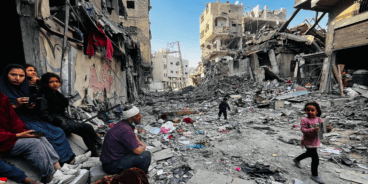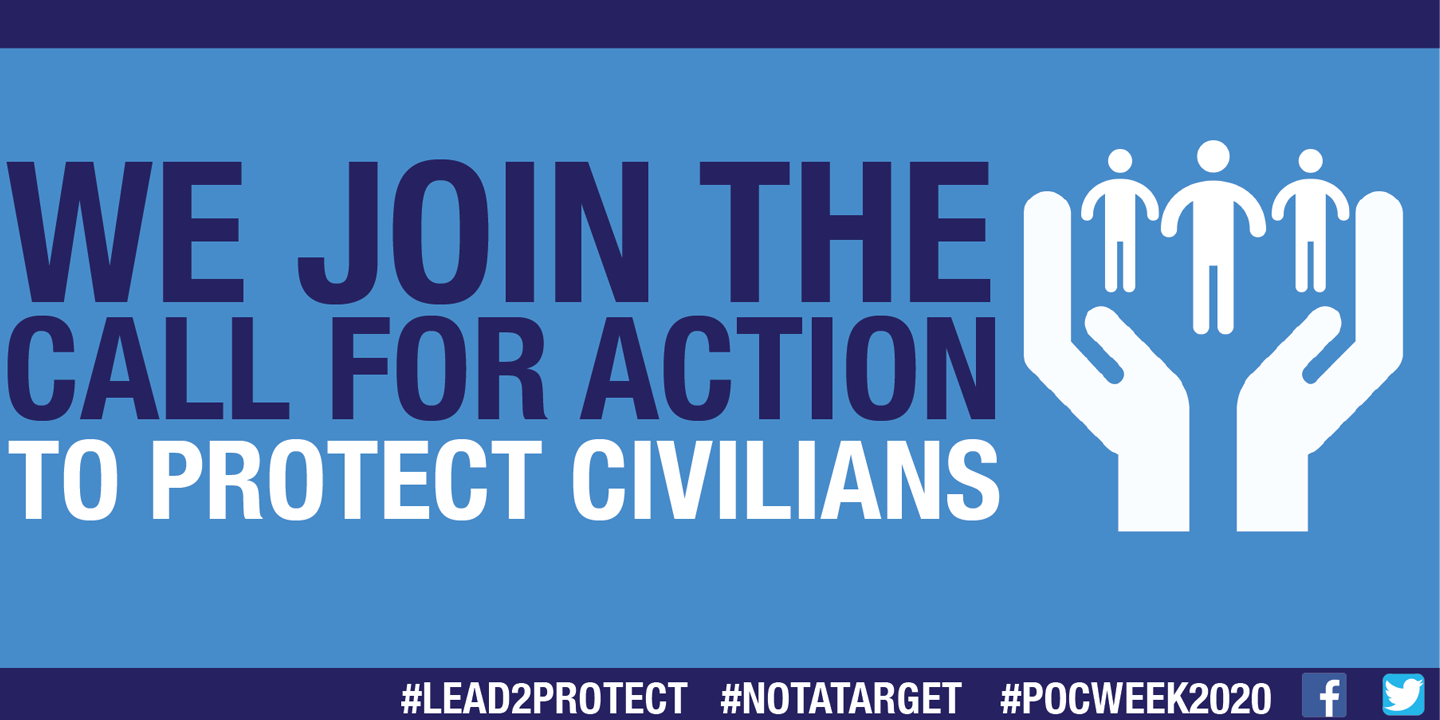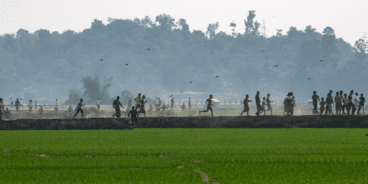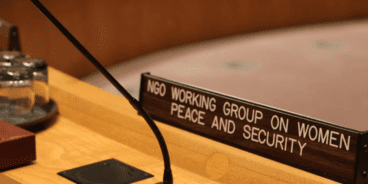

Joint Letter: Civil Society Call for Action to Protect Civilians
In the more than 20 years of consideration and prioritization of the protection of civilians in armed conflict by the UN Security Council, significant progress has been made in building an international normative civilian protection framework. However, compliance with the laws and norms that safeguard civilians has deteriorated along with the safety and security of civilians caught in armed conflict. Conflicts of today continue to have devastating impacts on civilians, critical civilian infrastructure, protection, livelihoods, education, health systems, and food and water security, particularly when explosive weapons are used in populated areas.
As the world faces the unprecedented challenge of responding to the COVID-19 pandemic, those living in conflict-affected countries are among the most vulnerable and at risk from the devastating consequences of the disease. They live in countries such as Afghanistan, Central African Republic, Libya, Mali, Nigeria, South Sudan, Syria, and Yemen, with weakened or decimated health infrastructure, where those working to help them are targets of attack and where humanitarian access is challenging. Constraints placed on peacekeeping operations, severe restrictions on rights and freedoms, and devastating socio -economic impacts may contribute to political destabilization, exacerbate existing armed conflicts, or lead to the emergence of new protection risks for civilians. There is a limited window of opportunity to effectively respond to this crisis and demonstrate global solidarity.
Now more than ever the UN Security Council, Member States, and the UN System must take urgent, bold and practical steps to respond to the challenges that remain to the protection of civilians in armed conflict. We call on UN Member States to consider and support the following four key recommendations in advance of the coming UN Security Council Open Debate on the protection of civilians:
1. Reaffirm your commitment to the protection of civilians and to promoting and implementing international humanitarian law and other applicable legal and policy frameworks and call on parties to armed conflict to do the same. Call to end impunity, notably by holding perpetrators to account, especially on every deliberate attack on healthcare and education facilities, and support international independent investigative and prosecution mechanisms. The greatest advance in protection of civilians can and should come from parties to conflict upholding their obligations under international humanitarian law and other applicable frameworks;
2. Demonstrate leadership by articulating the practical steps and financial decisions taken to promote protection of civilians. Make bold, forward-looking political and financial commitments to translate laws and norms that safeguard civilians in conflict zones into practice. Accord peacekeeping operations with protection of civilians mandates, adequate financial resources and staffing to carry out protection tasks, including senior protection advisors, uniformed and civilian gender advisors, women protection advisors, child protection advisors, and community liaison assistants and language assistants. Prioritize investment in and support to women-led organizations given the disproportionate impact of conflict on women and girls and the dearth of women in leadership roles. Support the development of an international political declaration to strengthen the protection of civilians from the use of explosive weapons in populated areas.
Harm to civilians can be prevented if countries and armed actors take concrete steps to prioritize protection. The UN Secretary-General has called for action at the national level, including: first, by developing national policy frameworks on the protection of civilians; second, by maintaining a principled and sustained engagement with humanitarian organizations and non-state armed groups to negotiate safe and timely humanitarian access and to promote compliance; and third, by ensuring accountability for violations. These recommendations remain as relevant and urgent as ever. Moreover, the Declaration of Shared Commitments on UN Peacekeeping Operations includes a number of commitments that, if implemented, can help peacekeeping operations better protect civilians. Finally, the call for action made by 22 civil society organizations last year ahead of the Open Debate on protection of civilians provides a comprehensive set of practical recommendations to improve implementation and better protect civilians.
A roadmap is available. It is now up to the Member States, the UN, and civil society to take action and lead the way translating the laws and norms safeguarding civilians into practice;
3. Commit to a robust and sustained dialogue with civil society on the protection of civilians beyond the yearly debate. Greater outreach to women and girls in conflict-affected areas is needed to encourage and enable their full, equal and meaningful participation in decisions that will impact their lives and communities. Sustained political will and continuous discussion on good practices and remaining challenges is needed to move the agenda forward thematically, particularly in country-specific contexts. Civil society organizations are key to helping civilians protect themselves, including through unarmed approaches. Civil society organizations are also essential to the systematic collection of information and data regarding threats to civilians and civilian harm incidents, including grave violations against children, enabling more efficient and effective solutions to the protection of civilians in conflict. Civil society organizations work at global, national and local levels with communities affected by conflict and are uniquely positioned to connect stakeholders across all levels. It is critical that the voices of those they serve, including women, girls and boys, persons with disabilities, the displaced, and those most marginalized, are elevated and heard at the global level, particularly during these trying times.
4. Support all efforts by the UN Secretary-General and the UN System to prevent, respond to and mitigate the impact of COVID-19 particularly in countries experiencing armed conflict, including the Secretary-General’s call for global ceasefire. The threat posed by the global coronavirus pandemic to countries ravaged by armed conflict, and its disproportionate impact on women, girls and boys, calls for immediate and resolute action by the international community, especially by parties to armed conflict.
Conflict-affected nations will be severely impeded in preparing and responding to COVID- 19 if fighting continues. In the short term, the biggest loss of life may come from an erosion of humanitarian access and continuity of programming. It is therefore critical that states and all parties to conflict use this opportunity to reaffirm the core humanitarian principles and recommit to facilitating safe and timely access to humanitarian assistance and protection to affected civilians. This includes removing restrictions on movement for health and humanitarian workers, barriers for humanitarian supply chains, disproportionate responses by security forces, unreasonable bureaucratic impediments, and counter- terrorism provisions that unduly hinder the provision of principled humanitarian assistance. It also includes ensuring that a robust gender analysis underpins all aspects of COVID-19 responses, so that instead of exacerbating harmful social norms or exposing women and girls to even higher levels of gender-based violence, we use the pandemic as an opportunity to rebuild more equal, inclusive and resilient communities. Moving forward, governments must also ensure that security forces exercise restraint in the enforcement of COVID-19 related measures and adhere to domestic and international law so as to not exacerbate the suffering of civilians.
Endorsing Organizations:
- Action Against Hunger
- Airwars
- CARE
- Center for Civilians in Conflict
- Childfund Alliance
- FIDH
- Global Centre for the Responsibility to Protect
- Global Coalition to Protect Education from Attack Humanity & Inclusion – Handicap International
- The International Network on Explosive Weapons International Rescue Committee
- NGO Working Group on Women, Peace and Security
- Nonviolent Peaceforce
- Oxfam
- Pax
- Plan International
- Refugees International
- Save the Children
- War Child
- Watchlist on Children and Armed Conflict
- Women’s Refugee Council
- World Vision International
Related Content


